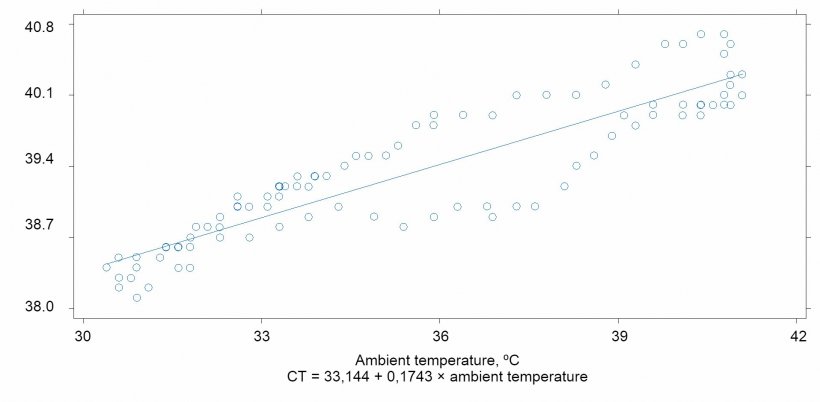Swine production in the world is mostly located in areas where ambient temperature is higher than the thermal comfort or thermoneutral temperature for pigs. Exposure of pigs to high ambient temperatures causes heat stress, which modifies their behaviour, physiology and metabolism in order to preserve homeostasis. The most noticeable changes brought about by heat stress in pigs include a reduction in voluntary food intake and an increase in body temperature. In turn, this increase in body temperature leads to an increase in their blood flow to the periphery. These changes are designed to reduce the production of body heat and promote its elimination to the environment. However, several studies have consistently observed a close relationship between the ambient temperature pigs are exposed to and their body temperature (Morales et al., 2015, 2016.) I.e., when the ambient temperature reaches critical values, the animal's ability to remove heat is not enough to keep the body temperature unchanged, thus raising it by up to 2 °C (Morales et al., 2016; Pearce et al., 2014.) This situation can affect the integrity of the pigs' intestinal epithelium and, consequently, the digestion and absorption of nutrients.

Relationship between ambient temperature and the pigs' body temperature (r2 = 0.90)

As a mechanism to dissipate heat, the body increases blood flow to the periphery, but decreases the supply of oxygen and nutrients to tissues in the GI tract, which causes oxidative stress in the intestinal epithelium. The combination of hypoxia, nutrient deficiency, and oxidative stress leads to an increase in the death of intestinal villi cells, which results in a reduction in size and damage to the intestinal epithelium (Liu et al., 2009.) The increase in cell death increases the endogenous loss of some AAs, particularly arginine, phenylalanine, histidine and threonine (Morales et al., 2016), whereas the smaller intestinal villi size due to heat stress can affect the digestion of proteins and uptake of AAs (Morales et al., 2015.)
Apparent ileal digestibility of AAs is defined as the small intestine disappearance of the AAs ingested with the diet (Stein et al., 2007), and is calculated by subtracting the amount of AAs that reach the end of the small intestine from the amount ingested. The total amount of each AA reaching the end of the ileum includes the unabsorbed AAs from the diet plus the AAs contained in undigested endogenous proteins. The reduction in the size of intestinal villi due to heat stress (Yu et al., 2010; Pearce et al., 2014) suggests that pigs in these conditions have a smaller number of intestinal cells (enterocytes) able to carry out the digestion of proteins and absorption of AAs. A marked reduction in the abundance of AA transporters has been seen in enterocytes of pigs exposed to heat stress (Morales et al., 2014). The greater endogenous loss of some AAs together with the lower absorption capacity due to heat stress affect the apparent ileal digestibility of arginine, histidine and leucine, which are the same AAs whose endogenous loss increases due to heat stress. Standardized ileal digestibility is calculated in a similar way to apparent ileal digestibility, but a correction is added for the endogenous amount of each AA that reaches the terminal ileum. Heat stress also appears to reduce standardized ileal digestibility of arginine and histidine in pigs under heat stress (Morales et al., 2016). That is, heat stress not only increases the loss of arginine and histidine of endogenous origin, but also reduces the digestion of endogenous proteins rich in these AAs or the reabsorption of the AAs included in them. The lowest standard ileal digestibility of arginine and histidine in pigs under heat stress coincides with the lowest jejunum abundance of their transporter (Morales et al., 2014). Interestingly, heat stress does not affect the apparent or standardized ileal digestibility of AAs included in free form in the diet (e.g., lysine) because their absorption starts in the duodenum and they do not compete with protein bound lysine included in the diet, which must be digested before releasing it to be absorbed in the jejunum and the ileum.

Apparent amino acid digestibility in pigs exposed to comfort ambient temperature (24 ± 2 °C) or heat stress (daily variation of 30 to 42 °C).
To sum up, pigs exposed to heat stress increase their body temperature and reduce the size of their intestinal villi, thus increasing the loss of endogenous AAs and reducing the abundance of AA transporters in the intestine, apparent and standardized ileal digestibility of AAs. Together, these changes directly and indirectly affect the AA absorption capacity of pigs exposed to heat stress, and apparently do so in a differentiated manner since they primarily reduce the apparent ileal digestibility of arginine, histidine, leucine and threonine. However, the inclusion of free AAs in diets for pigs under heat stress can correct the negative effects that heat stress has on the absorption of AAs.



